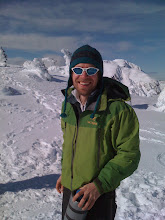Gov. Palin's sub-cabinet on climate held its third meeting yesterday, in Fairbanks and open to the public. I couldn't help but think back to the first meeting of the AK Climate Impact Assessment Commission, which was held in the same room on the UAF campus. That felt like high school. This felt like college. The presenters seemed more on point, the public testimony more direct, and the people listening, I got the sense, more prepared to act.
Here's the story I wrote for today. It's not exactly sexy, I realized after I wrote it, but at the time it seemed like a big deal -- that a large number of states were doing significant, creative things, and that Alaska might.
The meeting of the work group on immediate needs was just as exciting, but I had to skip out half way through and barely mentioned it in the story. Representatives from the coastal villages IDed as having the most serious risk of getting washed away described their struggles trying to find money and work with federal agencies like the Army Corps. A few talked about the need to have a lead federal/state agency handling erosion and village relocation, I heard after. That's been talked about since the assessment commission got started (almost a year ago) and I'm sure for longer than that. I wonder when it will happen.
Another when is when Palin is going to spend the first state money on climate change. Right now the sub-cabinet is just relying on funds from the individual departments. At some point, it will need some money. The CCS guy yesterday said his group would demand "enough [money] to show that you're serious."
This morning I got an e-mail from a man at a North Carolina "free-market" think tank with a long list of writings on why CCS is bogus and a bad idea. Here's a taste.
The reason I skipped out of the meeting yesterday was to go see Katey Walter in action. I realized after that it was basically a live press release I was going on -- I had thought we were tagging along on some real fieldwork -- but I don't regret it. Walter is getting lots of attention for her work on the release of methane from Arctic lakes -- why it's happening, whether it's increasing with thawing of the ground under lakes, how great a climate feedback it is. We went to test for methane, I suppose, although we basically just went trotting around a few ponds looking for gas pockets we could light on fire. UAF's PR department was there taking video. Sorry I don't have a picture to post.
At the first pond we went to, Walter showed us an underwater bubble trap, shaped like an umbrella, used to measure the amount of gas coming up from a source on the bottom. A Romanian grad student punched through the ice with a steel digging bar, and Walter pulled out ice chunks and then the trap with bare hands. They poked holes in bubbles in the ice and lit them on fire, and Walter warmed her hands in the flame. It was about 15 degrees.
At the second pond, they lit off pockets of methane over and over again. The grad student stabbed holes in the ice with a river knife, while Walter held matches to it. Big fireballs sent her stumbling backwards more than once. Gas from one hole roared out like air from a flat tire. One flame burned for 30 seconds.
I got it after the first explosion that there was methane in lakes. After we'd crisscrossed the pond and lit off a good dozen, one of them shooting flames 20 feet high, I started to think, Holy sh_t there's a lot of methane!
Subscribe to:
Post Comments (Atom)

No comments:
Post a Comment